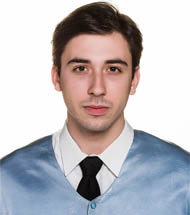20_02_20_EDU_entrevista
"Psychology can contribute a lot to solving the great problem of people's quality of life".
Interview with Álvaro Mancho Triguero (PSI'18) after obtaining first place in the exam. spanish psychology residency program

Last Monday, February 18, the results of the exam spanish psychology residency program (Resident Internal Psychologist) were known. In this call, more than 4000 people from all over Spain applied for 189 positions.
Álvaro Mancho Triguero, who obtained the first place, is former student of the School of Education and Psychology and belongs to the first graduating class of the Degree in Psychology at the University of Navarra.
Why did you decide to study Psychology?
I have always been attracted to the world of the mind and the brain, but it was not really until the beginning of the degree program when I realized that the greatest challenges of this century can be answered from our field (along with other disciplines such as neurology, Biochemistry and a long etcetera). On the other hand, psychology can contribute a lot to solving the great problem of people's quality of life. Thanks to all the technical advances, we have managed to extend people's lives. Now it is time to preserve their quality of life and their dignity.
What do you remember most about your years at the University of Navarra?
I have many memories of these years: friendships from degree program that still last, also from other Degrees that have result been some of my best friends, the teachers, the internships.... Choosing one would be complicated.
Any favorite subject ?
I loved all the clinical ones, as well as all the more "theoretical" or "experimental" ones. We have had great professors, who certainly need more recognition than they have. Anyway, for my personal preferences, I would have to choose the subject of Neuropsychology, fourth year, taught by Dr. Felix Inchausti. This subject increased my desire to focus on this field.
Did you always know you wanted to study spanish psychology residency program ?
Due to the vicissitudes of life, I considered pursuing a master's degree in psycho-oncology and palliative care, but my vocation led me very quickly to spanish psychology residency program .
How did you prepare for the exam?
It's a very complicated question. This is the second time I was applying, having stayed close last year. This year I continued with the same academy, but used their resources and exams from other academies as a base on which to expand. Anyway, my study focused on the " reference letter manuals " that historically have composed the core of spanish psychology residency program . In addition, through social networks, I have met many people without whom this would have been impossible, and who have supported me in my study, both in the form of internship (asking questions and study groups) and by providing me with essential emotional support. I cannot thank them enough.
You mentioned that it was a difficult exam, what was your feeling when you took it, did you think that, even though it was difficult, you would be able to opt for a place?
When I came out of the exam I was disoriented, as if I had just come out of a boxing match. I wondered if I could make it to place or not. Every time I thought about it, I noticed that I had nothing to hold on to, because it was obvious that my points were going to go down compared to the exams and mock exams I had taken during the course. It was days later, discussing it with colleagues, when I saw that the feelings I describe had been generalized, and then I could think a little more clearly.
What did you do the day before the exam and what did you do afterwards?
The day before the exam I did exactly what they recommend not to do. I was very nervous and the only way I found to calm down was to continue studying as if it was just another day. I studied until ten o'clock at night, had dinner and went to sleep, although I recognize that it is necessary to rest the hours before the exam.
After the exam I had dinner with my mother, who came to visit me in Madrid (where I did the test), released a little tension and went to sleep. I had no body to go out.
How did you react when you found out about your result?
This is very curious. I had an intuition that the lists were going to come out on the 18th, so from first thing in the morning I looked at the Ministry's web page. I saw that they were there, but I could not download them because the page was not responding. Then I got a message from my friend María (who, by the way, also has place) telling me her results and congratulating me. It was then that she told me the position I had, and it was she who passed me the list where I could finally check it. I was incredulous (and still am), I don't even know how I reacted!
How do you see your future? In what field would you like to develop?
I still have to look for hospitals to do the residency program and see what might fit me best. Be that as it may, I still have years and years to learn and develop as a professional and as a person. I would love to continue in the field of neurosciences, working as a researcher and clinician in the area of neurodegenerative diseases and acquired brain disorders. In addition, if possible, I would like to make my niche in the academic world, teaching or collaborating in training projects.

